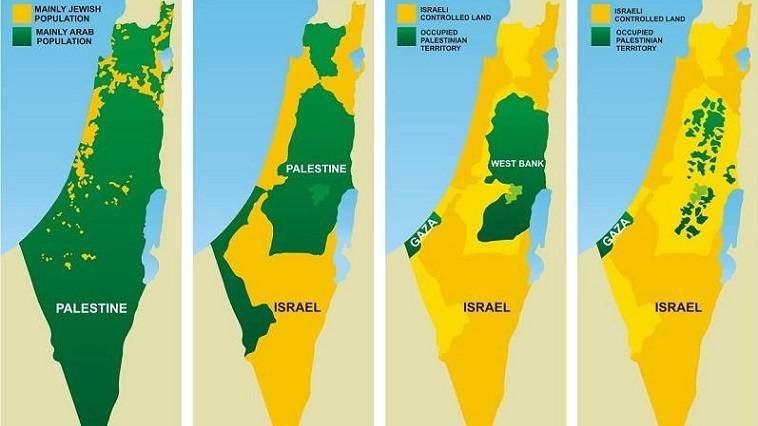
With the Israeli invasion of the Gaza Strip underway, but not yet fully unfolding, another war is being waged internationally on the battlefields of diplomacy, media, and social media. Perhaps in this propaganda war, and in the struggle of the two narratives, no blood has been shed, but it is certain that the truth about history and current reality is being mercilessly abused.
As is known, the problem begins before World War II, when Jewish diaspora circles began to imagine and plan for the return of Jews over the centuries to the “Promised Land,” the region known as Palestine. The problem was that local tribes had lived in that area since the 7th century AD. In the last century they were Islamized (a Christian minority survived) and Arabized.
The Holocaust of the Jewish communities in Europe, as expected, caused a very strong emotional shock at the international level, with the result that the hypothesis of the creation of a Jewish state gained mainly in the West, but also in “established socialist” Eastern Europe, ground by the end of World War II. Thus we arrived at the founding of Israel in 1948.
As expected, the Palestinians, or local Arabs, who owned land in the area – with a few exceptions – resisted. At that time, two opposing national interests collided, causing the two narratives to collide. The Jews felt – especially after what they had suffered – that they had the right to have a homeland of their own in the land of their very distant ancestors.
For their part, the Palestinians viewed the newly arrived Jews as invaders, expelling them from their ancestral homes to build their own state. For them, the partition of Palestine was tantamount to taking their land, which is why they rejected it. In other words, the basic condition for the establishment of a Jewish state was the ethnic cleansing of a large portion of the Palestinians. And this is what happened. Today, the Palestinians claim just over 20% of the territory they once controlled, but there is no indication they will get it.
The conflict of the two novels
Thus began the so-called Arab-Israeli conflict. We are talking about the Arab-Israeli conflict, because at that time the awareness in the Arab world was much stronger because although there were different Arab countries, the Arab nation was one. Thus, we rushed into Israel’s successive wars with the neighboring Arab countries, Egypt, Jordan, and Syria.
Israel’s successive victories – with the full assistance of the United States in particular – not only greatly expanded its territory, but also strengthened the belief that it was a militarily invincible state. This belief was derived from the belief that it is realistic to complete what they began in 1948, which is to seek to establish “Greater Israel” that includes the occupied Palestinian territories.
But the condition for their success was a second major wave of ethnic cleansing. Since the development of the Palestinian resistance, the Palestinians who were not displaced in the first period have become attached to their homes. Neither the international community nor Israeli society can morally and politically tolerate a second wave of blatant ethnic cleansing, despite the conflict between the two narratives.
Therefore, the strategy followed by Israel can be summarized as follows: “We will make the lives of the Palestinians unlivable to force them to leave their homes.” However, since Israel had to maneuver diplomatically in the wider region to isolate the Palestinians as much as possible from the Arab countries, it was forced to make some concessions, such as returning the Sinai to Egypt to close this front (agreement with Anwar Sadat). ).
Double degradation
In the years that followed, the Jewish state achieved much at this level. The front with Jordan had closed, Lebanon was weak, once-powerful Syria had become a shadow of itself, and Saddam Hussein’s hostile regime in Iraq had ended 20 years ago, while he normalized relations with the UAE under the Abraham Accords. He was preparing to do the same with Saudi Arabia. In addition to all this, he succeeded in dividing the Palestinians. By poisoning the besieged Arafat in Ramallah – by all indications – they opened the way for the leadership of the Palestinian Authority to Abbas, the Palestinian leader most suitable for Israel.
His condescending attitude toward Israel, especially toward the establishment of illegal settlements on Palestinian land in the West Bank, has fueled Hamas. This Islamic organization had received indirect support in previous years from the Jewish apparatus in order to weaken the secular, left-wing Palestine Liberation Organization, which dominated the political representation of the Palestinian movement.
The truth is that Tel Aviv, when Hamas won the elections, indirectly favored the outbreak of a civil war within the Palestinians, which led to Abbas officially maintaining control over the West Bank, while Hamas was limited to the Gaza Strip. One way or another, the Arab-Israeli conflict has been downgraded to a Palestinian-Israeli conflict, and in recent years it has been downgraded to a Hamas-Israeli conflict. The clash between the two narratives was adjusted accordingly.
Has a Palestinian state been proposed?
Of course, this double reduction is a positive thing on the diplomatic and military levels for Tel Aviv. The only regional power that continues its anti-Israel rhetoric is Iran, while its Shiite Hezbollah party poses a political-military problem for Israel on its northern border. As the 2006 war showed, it seems too late for the Israelis to enter and exit Lebanon at will and without hindrance.
Before we reach today’s bloody point, it is necessary to clarify the narrative often promoted by Israel’s friends in the world. They point out that Israel generously returned areas (Sinai) and withdrew from other areas (southern Lebanon and the Gaza Strip), and this is true, although these moves were dictated by expediency and not generosity.
They conclude by claiming that after the Oslo Accords, he proposed to Arafat the establishment of a Palestinian state, but he refused. The Israeli Prime Minister at the time, who was negotiating with Arafat, was right when he told him that what he was offering him would not be given to him by any other Israeli Prime Minister. However, what Israel proposed to the Palestinians was not an independent, sovereign state.
It may have been called the “Palestinian state” for obvious communicative reasons, but it was essentially self-government in a region, with no territorial continuity, and almost all levels that constitute state sovereignty remaining under Israel’s control. From the beginning, the Palestinian conflict was a struggle between two states over a piece of land. With the fait accompli created by successive wars, and since the genocide of Palestinians is off the agenda, the only realistic solution is a two-state solution, but two truly independent and sovereign states coexisting side by side, and turning the page. As long as this is not done – and in the current climate this does not seem likely – successive bloody conflicts will occur.
Until the Hamas attack, the Palestinians were almost marginalized on the international agenda, not only by the West, but also by the Arab regimes. This is despite the fact that in the West Bank we have dozens of Palestinian deaths every month, mainly due to their reaction to the construction of illegal settlements on Palestinian land. The “quiet occupation,” which lasted until October 7, ended with a Jewish bloodbath, and in the following days with a Palestinian massacre. The spotlight has once again been placed on the region, and this sometimes decisively affects not only the policies of local “players”, but also the policies of the great powers.
The color of religious war
The Jewish narrative about Hamas’s vile massacre of civilians usually begins on October 7, skipping the events that actually set the stage for the massacre. This may be convenient for propaganda, but it does not correspond to historical reality and journalistic honesty. Hamas’s invasion of southern Israel was a military operation in this strange war, but the indiscriminate massacre of civilians was an act of terrorism, even a heinous act. There is no debate about that.
The mass murderous bombings to which Israel is currently responding have cost the lives of five times as many Palestinians, not to mention the inhumane conditions to which the Palestinian population as a whole has been condemned. Everything shows that the worst is yet to come. Israeli soldiers may not shoot Palestinian civilians in cold blood (although this has happened repeatedly), but the mass and indiscriminate bombing of residential buildings is neither consistent with the law of war nor with morality.
I mention the above, without the slightest intention of compensation. No crime erases another crime. If we agree that the human life of an Israeli does not matter more than the life of a Palestinian, then the number of casualties on both sides is not an insignificant detail that can be overlooked, as many do. Israel clearly has the right to self-defense, but so do the Palestinians. Except they don’t have the weapons systems and military capabilities that Israel does, which drove them to terrorism early on. The weak in the struggle of history usually do the same. Wasn’t it Menachem Begin, a member of the Jewish Irgun, who bombed the King David Hotel in Jerusalem when it was under British occupation?
Worst of all is that the horrific massacre that took place on October 7, precisely because it was carried out by the Islamic jihadist movement Hamas, actually arouses religious sentiments, painting the problem of national liberation, like the Palestinian problem, in the colors of religious war. . Aside from the clash between the two narratives, this may be appropriate for Hamas, because it tramples on Islam and seeks to rally Muslims everywhere around it. This may also be convenient for Israel, because it at least forces the West to fall behind it. The societies that are certainly not comfortable are Western societies.
- The opinions expressed in the text are the personal opinions of the author and do not necessarily reflect the position of SLpress.gr
- Republishing the article from other sites without the permission of SLpress.gr is prohibited. It is allowed to republish the first 2-3 paragraphs with an active link added to read the rest on SLpress.gr. Violators will face legal action.

“Hipster-friendly coffee fanatic. Subtly charming bacon advocate. Friend of animals everywhere.”




More Stories
More than 200,000 people have registered on the platform
Middle East – Blinken: Israel's “extremely generous” offer to Hamas regarding Gaza
Postal voting: Registration deadline ends tonight – electoral file will be sent by May